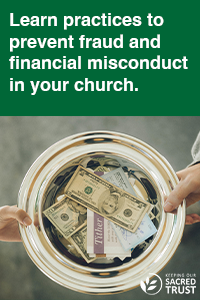If you want your heart to be with God, here’s a suggestion I’ve found to be very powerful in my own life. Put your money where you want your heart to be. Jesus said, “Where your treasure is, there will your heart be also.” In other words, your heart follows your money, not the other way around. We think it’s the other way around. We think we spend our money on the things that are important to us. Jesus is trying to tell us that those things have become important to us because they’re what we spend our money on. Put your money where you want your heart to rest, and your heart will move there.
Giving a percentage back to God of whatever God has given us turns our money into a tool that is in service to our relationship with God and to our spiritual transformation.
If you really want your heart to be with God — and I believe you do — then you might want to change how you give to your parish and to God’s work accomplished by other charities. Don’t treat your charitable giving as just another bill that has to be paid — or as one that doesn’t get paid if there’s not enough left over. Don’t think of your gift as a tax or as club dues, and for heaven’s sake, don’t let it be just a tip that’s less than you spend on lunches or commuting.
Make your gift a first-fruits offering. Fix a percentage in your heart and in your head, and give that percentage off the top to God every time money goes into your bank or into your hand. If you get money once a month, then give your percentage off the top once a month, and don’t give the other weeks. If you get paid twice a month or every other week, then give at those times. Give weekly only if you receive money weekly. This is the first radical thing I’m suggesting. Stop giving by the week. Give to God at those times when God has given you something. And the second radical thing I’m suggesting is that you give back to God a percentage of what God has given you.
What percentage? We tithe. That’s 10 percent of everything we receive, the first checks I write after receiving any money. If you want to try putting your money where you want your heart to rest, I strongly suggest you try giving at least 5 percent off the top back to God whenever God gives you anything. Giving to God off the top a percentage of what God has given you is good, strong medicine for the heart. Ten percent is the recommended dose. Five percent is therapeutic but giving back to God any percentage off the top — 2.5 percent, 3 percent, or 4 percent – is better for your heart than giving any set amount that is not off the top and that has no relationship to income.
It’s easy to figure what percentage you’re already giving. Divide what you give by your income. If what you’re giving works out to be less than 3 percent of your income — and some find it works to less than 1 percent – then please just try giving God off the top three or five cents of every dollar God gives you. You can give a nickel off the top of every dollar you get. You’ll do just fine with all your other obligations. In fact, the more anxious you are now about money, the more important it is to change how you give. Put your money where you want your heart to rest. Your heart will move there, and you’ll be much less anxious about money because you’ll be trusting God’s promises, and that’s the essence of faith.
What do you put on a pledge card? I put an estimate of what I think my percentage will result in, turn in the pledge card, and forget the estimate. I concentrate on the percentage. It’s always turned out all right.
This will change your life. You may think that paying your bills is the least religious thing you do. Percentage giving off the top begins to change all of that, because each time you sit down to deal with your money, the first thing you do is to make a thank offering to God that is in proportion to what God has just given you. It changes how you think about your life and what you have. It turns dealing with your money into an act of faith, part of our worship in spirit and truth. It makes it far more likely that you will come to understand yourself as a steward of God’s free gifts, rather than the owner of what you have.
Here’s one way things change. If we think we are owners and that it’s all up to us, it’s easy for money to become the end. Getting enough money can become our life’s goal. Well, if money is the end, then it’s also easy for people and relationships to become means to that end. Proportional giving off the top, at least in my experience, changes that almost immediately. Especially if the percentage you’ve set is more than you really think you can possibly afford, almost with the very first check, things change. You realize that money is a tool: it’s a means; it’s not the end. Relationships and people, particularly our relationship with God, can become the end. And almost immediately you realize that it’s not just up to you. God is in it with you. You’ve decided to rely on God’s promises, and that is the essence of Christian faith. You come to experience what St. Paul is talking about: “work out your own salvation with fear and trembling; for God is at work in you, both to will and to work his own good pleasure” (Phil. 2:12b-13).
Whether we think of money as an end or a means, in fact, our money is always a tool, and it’s a tool that is always working on us. Most of the time, especially when we think getting money is the end, money works on us by making us feel more anxious and more driven. However, giving a percentage back to God of whatever God has given us turns our money into a tool that is in service to our relationship with God and to our spiritual transformation. Giving back to God a percentage of what God has given us helps us really trust God with our whole life. It helps us come to want to live the way God wants us to live. I’m quite serious. When I began to tithe as an adult, it changed my life. I believe I can predict that this can change your life as well.
I think if you try giving this way for a period of time, you’ll wonder why no one ever suggested this to you before. And I doubt you’ll ever go back.
This material is reprinted with the author’s permission from his book Remember the Future: Financial Leadership And Asset Management for Congregations (Church Publishing, 2006).






